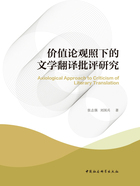
Chapter 1 Translation and Literary Translation
“What translation is? I am afraid that none of those engaged in studying translation theories can avoid asking and answering this question.Personally,I think there are at least two reasons for this: one is that it seems the starting point of all the scientific researches to ask what X is and the other is that we have to know first what translation is to discuss the other related important questions in translation studies”.(Xu Jun 2001: 5)
The earliest monograph on criticism of literary translation Studies on Criticism of Literary Translation by Xu Jun(1992)begins with the definition and the essence of translation.Following Xu,the authors of the present book will first of all come to the discussion about the definition of translation as people's ideas about translation criticism are often related with and can often be inferred from their definitions of translation.Actually,the authors find it a common way for many writers doing scientific researches to begin with the definition.Alexander Fraser Tytler once said(at the beginning of his Essays on the Principles of Translation),“if it were possible,accurately to define,or,perhaps more properly,to describe what is meant by a good Translation,it is evident that a considerable progress would be made towards establishing the Rules of the Art,for theses Rules would flow naturally from that definition or description”(qtd.in Shen Yuping 2002: 166).And Tytler's three principles,or “laws of translation” in his own words(ibid: 167),are simply the result of his analysis of what a good Translation is.Actually,We can further Tytler's statement by saying that if we know what a translation is or should be,then it is easier for us to know,and to agree upon,how to criticize a translation or how to evaluate a translation as Yang Xiaorong(2005: 8)says to the effect that one's idea about translation determines one's views on how to evaluate a translation.“Before attempting to develop a model for translation quality assessment,we first have to be more precise about what we mean by translation”(House 1981: 25).House's words are to the point.However,the fact is that it is hard to give a definition of translation to everyone's satisfaction as Tytler further mentioned “[b]ut there is no subject of criticism where there has been so much difference of opinion”(qtd.in Shen Yuping 2002:166).Hartmann(2006)reviewing An International Encyclopedia of Translation Studies published in Berlin in 2004,says that“I looked in vain for a secure definition of translation,in terms of proposed theoretical models and empirical observations of the process”.
Things are made even more complex as the word “translation” can refer to the result of translating and the process of translating itself.In the fields of physics,chemistry,computer science and medical science,people use the term “translation” to refer to quite different things.And in China,the term fanyi also refers to a person who does written translation or oral interpretation.The authors of this book do not want to discuss all those definitions since it is on the one hand impossible and on the other hand unnecessary.Only part of them will be discussed to meet the demand of the present research of getting to know those representative ideas about translation in the field of Translation Studies.And to meet our demand,the definitions to be discussed include those of the ancient times and the present day in China and in the West.